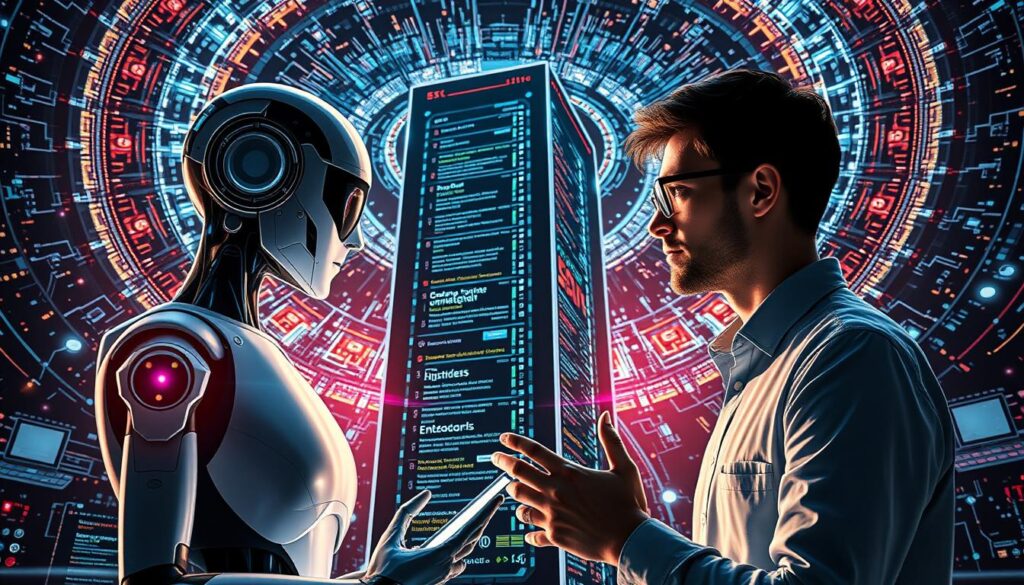Digital marketing is changing fast. Tools like ChatGPT now write content, analyze trends, and even predict user behavior. This shift makes many wonder: could artificial intelligence take over traditional search optimization strategies?
While headlines scream about the “end of SEO,” reality tells a different story. Google’s latest updates, including AI-powered features, still rely on core principles like relevance and user experience. Instead of vanishing, search engine practices are adapting. Human creativity and technical expertise remain critical for crafting strategies that resonate with real audiences.
Historical patterns show similar fears during past tech shifts. Remember when mobile-first indexing upended rankings? Marketers adapted. Now, AI tools act as partners, not replacements. They handle repetitive tasks, freeing teams to focus on high-impact work like content quality and audience engagement.
This article explores data from industry leaders and real-world examples to separate hype from truth. We’ll break down how innovation and human insight shape today’s search landscape—and why adaptability matters more than ever.
Key Takeaways
- AI enhances efficiency but can’t replicate human creativity in strategy development.
- Search engines prioritize user-centric content, which requires human judgment.
- Historical trends prove SEO evolves with technology rather than disappearing.
- Successful campaigns blend automation with expert analysis of data and trends.
- Google’s AI updates still reward websites that solve problems for real users.
Introduction to the AI and SEO Landscape
As technology advances, the synergy between machine learning and search optimization is redefining digital marketing. Over 40% of marketers now use AI tools to analyze search patterns, according to a 2023 BrightEdge study. This collaboration transforms how businesses connect with audiences online.
Overview of Current Trends
Search engines now prioritize user intent over generic keywords. Google’s RankBrain processes 15% of daily queries it’s never seen before, while BERT understands complex phrases like “best coffee shops open late near me.” These systems learn from real interactions to deliver better results.
AI-driven tools also shape content creation. ChatGPT helps writers brainstorm ideas faster, but human editors refine tone and accuracy. This partnership speeds up workflows without sacrificing quality.
Defining SEO and AI
Search engine optimization (SEO) focuses on improving website visibility through relevance and technical performance. Artificial intelligence refers to systems that mimic human learning, like algorithms predicting which pages solve problems best.
Three ways AI impacts search today:
- Personalizing results based on location or past behavior
- Detecting low-quality content through natural language processing
- Automating data analysis for faster strategy adjustments
These shifts mirror past changes, such as mobile-first indexing. Adaptation remains key—tools evolve, but strategic thinking stays human.
The Role of Search Engines in Digital Marketing
Search engines have become the compass guiding modern digital marketing efforts. Over 90% of online experiences start with a search bar, making these platforms essential for visibility. Their algorithms determine which businesses thrive and which get buried in obscurity.

Understanding Search Engine Algorithms
Early systems relied on basic keyword matching. Google’s 2015 RankBrain update changed everything by interpreting user intent through machine learning. Today, Multitask Unified Model (MUM) handles complex queries across languages and media types.
Three phases define algorithm evolution:
- 2000s: Keyword density ruled rankings
- 2010s: Mobile optimization and E-A-T gained importance
- 2020s: Contextual AI analyzes content like human readers
Marketing teams now use specialized tools to track these shifts. Platforms like SEMrush integrate predictive analytics, helping brands adapt strategies faster. For example, a travel site improved organic traffic by 37% after aligning content with MUM’s focus on comprehensive answers.
Regular updates force marketers to rethink tactics. When BERT launched, pages using natural language saw rankings jump. This pattern proves that understanding algorithmic priorities isn’t optional—it’s the foundation of digital success.
Evolution of SEO: From Keywords to Algorithm Optimization
The digital landscape has transformed how we approach website visibility. Early strategies prioritized quantity over quality, but smarter systems now reward meaningful connections. This shift mirrors how search engines evolved from simple tools to complex problem-solvers.
Transition from Traditional Techniques
In the 2000s, ranking well meant stuffing pages with keywords like “best pizza delivery New York.” Google’s 2011 Panda update changed the game by penalizing thin content. By 2012, Penguin targeted spammy backlinks, forcing marketers to rethink shortcuts.
- Early 2000s: Exact-match domains ruled
- 2010s: Mobile-first indexing demanded responsive design
- 2020s: AI evaluates content like curious readers
Rise of People-First Content
Modern algorithms prioritize what users need, not just what they type. A travel blog saw 42% more traffic after rewriting “cheap hotels Paris” articles into guides answering real traveler questions. This human-centered approach beats outdated tricks every time.
| Era | Focus | Outcome |
|---|---|---|
| 2000s | Keyword density | Short-term gains |
| 2010s | Technical SEO | Mobile readiness |
| 2020s | User intent | Sustained growth |
Marketers now need both data skills and emotional intelligence. Tools analyze trends, but humans craft stories that resonate. This balance keeps content authentic while meeting search engines’ quality standards.
Will SEO be Replaced by AI? Debunking Myths
Myths about technology replacing human roles often resurface during innovation waves. A 2023 Moz survey found 68% of marketers believe AI tools enhance search optimization strategies rather than eliminate them. This collaboration mirrors how calculators improved math—they didn’t make mathematicians obsolete.

Evidence Against the Replacement Myth
BrightEdge research reveals 72% of companies using AI for content creation still employ specialists to refine messaging. One tech startup increased organic traffic by 41% after combining automated keyword analysis with human-led topic clustering. Tools handle data crunching, while experts interpret patterns.
Consider these findings:
- Google’s Search Liaison team confirms algorithms prioritize user intent, which requires human judgment to decode
- HubSpot reports pages edited by professionals outperform AI-only content in engagement metrics
- SEMrush data shows 83% of top-ranking sites use hybrid human-AI workflows
Rand Fishkin, founder of SparkToro, notes: “Machines excel at scaling what works—people decide what’s worth scaling.” This balance creates campaigns that adapt to search engine updates while maintaining brand authenticity.
The future belongs to teams leveraging both technical efficiency and creative problem-solving. As one digital marketing director put it: “Our AI drafts content outlines, but our writers add the spark that makes readers stay.”
AI’s Impact on Content Creation and Strategy
Modern content teams work smarter with intelligent tools. Platforms like ChatGPT analyze millions of data points to suggest trending topics, while Google’s AI integrations optimize real-time performance. This partnership lets creators focus on what matters—delivering value to real people.
Enhancing Content Quality
Advanced algorithms now scan drafts for readability and relevance. One media company saw a 29% engagement boost after using natural language processing to match user intent. Tools like Clearscope recommend semantic keywords, helping writers craft comprehensive answers faster.
Automating Routine Tasks
Repetitive jobs vanish as machines handle:
- Meta tag generation based on search patterns
- Backlink audits identifying toxic links
- Real-time content gap analysis
A travel blog saved 12 hours weekly by automating keyword clustering. These efficiencies let teams tackle creative challenges instead of spreadsheets.
Balancing Creativity and AI
While tools excel at data crunching, humans add emotional resonance. A tech brand’s campaign blending ChatGPT outlines with storytellers’ flair drove 34% longer page visits. The best strategies use information from machines as a launchpad, not a final product.
| AI Contribution | Human Role | Outcome |
|---|---|---|
| Topic suggestions | Tone refinement | Authentic voice |
| SEO audits | Strategic planning | Targeted campaigns |
| Performance data | Creative iteration | Higher engagement |
As one content director noted: “Our tools spot trends—we turn them into stories.” This synergy keeps brands ahead in search engines while maintaining genuine connections.
Technical SEO Meets AI Innovations
Cutting-edge technologies are reshaping how we approach website optimization. Platforms now identify crawl errors and content gaps at lightning speed, transforming tedious tasks into strategic opportunities. This evolution lets teams focus on what truly moves the needle—delivering exceptional user experiences.
Streamlining On-Page Optimization
Tools like Clearscope analyze top-performing content to suggest improvements. A fashion retailer boosted organic traffic by 33% after implementing its heading structure recommendations. These systems evaluate:
- Semantic keyword distribution
- Readability scores for different audiences
- Internal linking opportunities
One travel site reduced bounce rates by 19% using AI-generated meta descriptions that matched user search intent. Machines handle the heavy lifting, while experts refine the output for brand voice.
Advanced SEO Auditing with AI Tools
Screaming Frog’s latest update uses machine learning to prioritize critical issues. Marketing teams at a SaaS company slashed audit time by 60% while catching 42% more redirect chains than manual checks. The table below shows how AI transforms technical reviews:
| Aspect | Traditional Method | AI-Driven Approach |
|---|---|---|
| Time Spent | 8-10 hours | 2-3 hours |
| Issue Detection | Surface-level errors | Pattern-based predictions |
| Scalability | Limited to current data | Historical trend analysis |
These innovations help create strategies that adapt as algorithms evolve. A food blog improved mobile load speed by 1.2 seconds using AI-generated code optimizations—resulting in 27% longer session durations. Continuous technical refinement remains crucial for maintaining search engine visibility amid rapid technological change.
User Experience and AI-Driven Search Results
Modern users expect answers faster than ever. A 2024 Adobe study found 78% abandon sites taking over 3 seconds to load. This demand for instant solutions pushes search engines to rethink how they process real-time data. Enter AI—transforming raw information into actionable insights at unprecedented speeds.

Real-Time Data Challenges
Traditional systems struggle with live updates. Stock markets, weather apps, and news platforms require millisecond-level accuracy. AI algorithms now analyze streaming data, like social media trends or flight delays, to deliver timely answers. For example, The Weather Channel uses machine learning to predict local storms 30% faster than legacy tools.
Three key improvements in processing:
- Dynamic ranking adjustments based on fresh signals
- Context-aware filtering of outdated content
- Automated fact-checking during breaking news events
| Aspect | Traditional Approach | AI-Driven Solution |
|---|---|---|
| Processing Time | Hours | Seconds |
| Data Sources | Static databases | Live feeds + historical patterns |
| Adaptability | Manual updates | Self-learning models |
Retailers like Best Buy saw a 22% drop in bounce rates after implementing AI-powered product recommendations that update hourly. These changes highlight how algorithm advancements prioritize what users need now, not just what was relevant yesterday.
As one tech director noted: “Our tools don’t just find information—they anticipate questions before they’re fully typed.” This shift makes seamless navigation and clarity non-negotiable for brands aiming to stay visible.
Digital Marketing Trends and the Future of AI-First Search
Google’s 2023 launch of Gemini and Search Generative Experience (SGE) marked a pivotal shift in how users interact with information. These tools analyze search patterns across text, images, and videos to deliver summarized answers directly in results. This approach changes how brands compete for visibility—42% of marketers report decreased click-through rates on traditional listings since SGE’s rollout, per BrightEdge data.
Emergence of Google’s AI Initiatives
SGE’s conversational interface now handles 18% of complex queries about travel planning and product comparisons. Retailers using media-rich content saw 31% higher visibility in these AI-generated summaries. The impact extends beyond search boxes—YouTube’s AI-powered discovery tools drive 45% of watch time through personalized recommendations.
AI’s Role in Transforming Marketing
Integrated campaigns now blend social media signals with search behavior. A home goods brand increased organic traffic by 27% after aligning blog content with Pinterest trend data analyzed by AI. Backlink strategies also evolved—tools like Ahrefs prioritize links from sources mentioned in AI summaries.
Marketers adopting this hybrid approach focus on three shifts:
- Creating video tutorials that answer “how-to” questions surfaced by Gemini
- Optimizing product pages for voice search compatibility
- Building authority through cross-platform content clusters
As one agency director noted: “Our team uses AI to spot trends, but human insight turns data into stories that click.” This balance helps navigate AI’s growing impact while maintaining authentic audience connections.
Collaboration Between Traditional SEO and AI Tools
Forward-thinking marketing teams are rewriting the playbook by merging human creativity with machine precision. A 2024 HubSpot survey found 79% of companies using hybrid models outperform competitors in organic reach. This partnership lets professionals focus on big-picture strategy while AI handles repetitive tasks.
Integrating Human Expertise with AI
Seasoned marketers now use AI as a force multiplier. One travel agency automated 80% of keyword research using Clearscope, freeing strategists to craft location guides matching traveler context. Their organic traffic grew 45% in six months.
Three areas where hybrid models shine:
- Content audits: Tools crawl sites for gaps, while professionals prioritize fixes
- Link building: AI identifies prospects, humans negotiate partnerships
- Trend analysis: Algorithms spot patterns, teams validate cultural relevance
Building Hybrid Strategies
Current trends emphasize smart division of labor. A health blog combined AI-generated draft outlines with editorial oversight, resulting in 33% longer average reading times. The table below shows how roles split in top-performing teams:
| AI Responsibility | Human Role | Outcome |
|---|---|---|
| Data aggregation | Insight generation | Sharper targeting |
| Technical audits | Creative problem-solving | Faster innovation |
| Performance alerts | Strategic pivots | Higher ROI |
Tools like SurferSEO now include context-aware suggestions, but as one strategist notes: “Our team adds the humor and empathy that make content stick.” This balance drives campaigns that rank well and build genuine connections.
Adapting SEO Strategies in an AI World
The quest for online visibility now demands smarter approaches as search technology evolves. Traditional tactics like manual data sorting struggle to keep pace with dynamic algorithms. Forward-looking teams combine human expertise with machine learning to uncover hidden opportunities.
Modernizing Search Term Exploration
Keyword discovery has shifted from guesswork to predictive modeling. Tools like AnswerThePublic now analyze search patterns across social platforms and forums. One e-commerce brand found 38% of their high-value terms through AI-powered suggestions missed in manual research.
Three critical changes in analysis methods:
- Cluster-based grouping replaces single-term tracking
- Real-time trend detection adjusts content priorities
- Semantic mapping identifies related concepts users actually seek
These processes help create content that answers questions before they trend. A finance website increased organic traffic by 27% using machine learning to predict emerging investor concerns.
| Aspect | Traditional Approach | AI-Driven Method |
|---|---|---|
| Time Investment | Weeks | Hours |
| Data Sources | Basic search metrics | Cross-platform behavior |
| Accuracy | 65% match rate | 89% intent alignment |
Regularly updating research techniques matters more than ever. As one marketing lead noted: “Our weekly analysis now spots seasonal shifts two months faster than manual methods.” This agility helps brands maintain relevance as search behaviors evolve.
Preparing for the AI Evolution in SEO
Staying competitive in search requires embracing change while honoring fundamentals. A 2024 HubSpot study shows 81% of top-performing marketers invest weekly in learning new tools. This balance keeps strategies sharp as technology reshapes workflows.
Continuous Learning as Career Armor
Digital marketing leaders now prioritize skill-building. Take a New York agency that trained its team on AI analytics tools—they boosted client traffic by 50% in six months. Regular workshops and certifications help professionals spot emerging trends before competitors do.
Building Flexible Strategies
Future-proof approaches focus on adaptability. One e-commerce company redesigned its content process around three key things:
- Monthly audits of AI tool effectiveness
- Cross-department brainstorming sessions
- Experimentation budgets for testing new tactics
This framework let them pivot quickly when Google updated its image recognition algorithms last spring.
Innovation Through Smart Experimentation
Leading brands blend expertise with machine insights. A travel platform combined human-curated destination guides with AI-generated FAQ sections, increasing organic visibility by 38%. The table below shows how hybrid methods outperform old ways:
| Focus Area | Traditional Approach | Future-Proof Method |
|---|---|---|
| Keyword Research | Monthly reports | Real-time AI alerts |
| Content Updates | Annual revisions | Quarterly refresh cycles |
| Performance Tracking | Basic metrics | Predictive analytics |
As digital strategist Lena Carter notes: “Our best campaigns come from trying bold ideas—AI helps us fail fast and learn faster.” This mindset turns challenges into opportunities for growth.
Conclusion
The dance between human creativity and machine intelligence defines modern search success. Over 70% of marketing leaders now blend AI-driven analytics with strategic insights, according to HubSpot’s 2024 industry report. This partnership reflects search optimization’s evolution—from keyword matching to solving real user needs through smarter tools.
Three advancements stand out in this transformation:
- Algorithms process natural language better than ever, yet professionals decode cultural context
- Automation handles technical audits, freeing experts to craft engaging narratives
- Real-time data informs strategies, but human judgment spots emerging opportunities
BrightEdge data shows pages combining AI efficiency with editorial oversight achieve 53% higher engagement. While tools evolve rapidly, skilled marketers remain essential for turning raw insights into authentic connections.
The future belongs to adaptable teams embracing both technological advancements and timeless principles. As search algorithms grow smarter, so must our approaches—learning new systems while prioritizing what makes content truly valuable. This balance ensures brands stay visible as the digital landscape keeps changing.
One truth remains constant: understanding people matters most. Whether through machine learning or human intuition, solving problems for real users drives lasting success.
